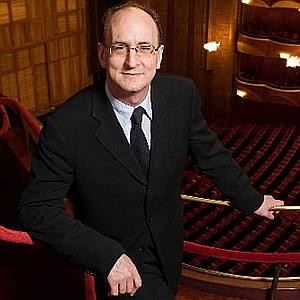Peter Gelb Elevated to Artistic Director of the Met
Gelb Makes Announcment in NY TImes
By: Susan Hall - Mar 31, 2013
Peter Gelb, recently elevated to artistic director of the Metropolitan Opera, has orchestrated an 9000-word piece in the magazine section of the New York Times defending against wide spread criticism of his regime.
The Times notably ignored the dinosaur in the Lincoln Center Plaza, outdated and most often acoustically poor houses that are too large for contemporary audiences who want warmth and intimacy in their art.
Architectural critic Victoria Newhouse reported that despite the participation of prominent architects like Philip Johnson and Eero Saarinen, “the Lincoln Center theaters have been the butt of negative criticism from the moment they were completed. The dean of architectural critics, Ada Louise Huxtable, called them ‘soft modernism.’ Their architecture and the acoustics of their auditorium (except for the Metropolitan Opera House and Alice Tully Hall, to a point) were deemed qualitatively inferior and urbanistically the center has failed the test of time. Placed within a superblock and elevated like temples on a plinth, Lincoln Center’s buildings were isolated from the low-income housing behind on Amsterdam Avenue.”
Newhouse continues, “The idea of exclusivity applied to art, which still held sway in the mid-twentieth century, was by the turn of the twenty-first century incompatible with efforts to make all the arts part of everyday living.”
A $125 million undertaking to make Lincoln Center more user friendly resulted in a wonderful Alice Tully Hall, but focusing on saying hello in lights across the risers of the steps on 9th Avenue and 64th Street and around the corner on 65th Street, when acoustical issues have hounded Avery Fisher Hall and Koch Hall, is misdirected money and energy.
Between Alice Tully Hall, and the thousand points of light created by the hellos, the planting of some trees to soften the dated International modernist architectural style, and a fountain programmed to imitate Zurich’s, not much has happened.
Journalists were invited a year ago to submit emailed questions to Gelb. At the time we asked if breaking up the Met into three opera houses, one 2200 (the right size for singers), one 1000 for more risky works, and an even smaller 500 seat theater for experimentation, would be a possible option. Although we followed protocol, Gelb did not respond to our questions.
So much for transparency from the often Byzantine Met.
The Times article fails to mention that the Met was either half empty or half full for the fall season. Gelb is not entirely responsible for this. A 4000-seat house does not fit the taste and economy of less grandiose times. Archly, Gelb constantly declares himself a man of the people. But he is out of touch with the prevalent zeitgeist. People want to be close to their art these days. In live performances this quality is best delivered in smaller houses.
A large part of the success and failure of the Met in the past few years revolves around the now global and enormously popular Live in HD broadcasts. The HD’s succeed in drawing people close. A camera zooming in on the face of a singer, projected on a theatre’s screen, gives a false positive of intimacy that is lost on those attending the actual performance. Yet these theatrical presentations do not seem to have caught on with a younger, new audience. The Met’s broadcasts are no longer exclusive as a competitive range of offerings has emerged for this format. Opera, dance and theatre lovers have a number of first class options for popular HD broadcasts.
What is to be done about a 4000 seat house that singers still sign on for? The Met’s far reaching prestige as one of the world’s leading opera companies has not yet been eroded by Gelb’s autocratic and monolithic leadership. For the performers it’s a prestigious gig that pays well by opera standards. Singers get a double fee (for the top artists $32,000) for singing in a HD matinee performance. They also benefit from the exposure and publicity of a HD broadcast which reaches an enormous audience. But singers don’t like the house and the pressure its size puts on their voices.
Gelb made two remarks in the Times piece that should have raised eyebrows. He declared himself “artistic” director (“Gelb’s most important job is artistic director”), when clearly, as a layman, he lacks the qualifications to organize a program and appoint or audition singers. This eyebrow raising elevation appears to be the solution to fill the Met’s top position following the long drawn out demise of James Levine.
This palace intrigue has the elements of a Shakespeare drama like Macbeth or Richard III. Gelb appears to have influenced the Times reporter to suggest that his musical abilities came from his great uncle, Jascha Heitfiez. “There was prodigious musical talent on [Gelb’s mother’s] side of the family,” the Times reports.
Gelb’s grandmother “Elza, was a sister of Jascha Heifetz, whose musical abilities, according to family legend, were discovered one day in Vilnius, Lithuania, by his father, Ruvin, who noticed happy songs he played on the violin made Jascha giggle and sad ones made him cry… Fitted with his own violin at age 4, Jascha made his Carnegie Hall debut at 16; meanwhile, Ruvin began to shake the family tree, hoping to flush out more prodigies. He approached each of his grandchildren with a tuning fork and held it up to their ears to see what reaction the sound provoked. When great-grandchildren appeared, [Heifetz’s brother] tested them, too. Both Gelb…and his brother, Michael, two years older, received visits from great-grandfather Ruvin. 'Peter was his last hope' Barbara Gelb recalled. ‘Grandpa struck the tuning fork and held it by Peter’s ear, but he got no reaction.’ "
If Gelb does share the Heifetz gene pool, he clearly missed out on its musical chromosomes.
Interestingly Gelb referred to 'HD season' and the ‘house season' as two separate seasons. Is it possible that he will be moved to HD only in order to bolster the live in-house productions he so poorly understands?
James Levine’s role at the Met is discussed in the article. It is hard to imagine Gelb, who according to documentarian Susan Fromke, divides his day into fifteen minute segments, often got into a cab to visit Levine during Levine’s long absence from the Met. The description of Levine in the Met’s bond offering this past December did not mention his physical ailments.
The Met's management published Levine’s doctors’ reports. Arguably, that was not necessary as long as Levine correctly revealed the extent to which he could or could not fill his role as music director. However, some of Levine’s more pressing problems were not revealed. In the bond offering, this is deceptive advertising. Many observe that an ailing Levine is propped up so that Gelb remains in control. Obviously, no qualified musical director will come to the Met as long as Gelb is de facto artistic director.
None of this bodes well for future Met seasons. Gelb continues an attempt to control the media but he can’t silence all of the critics all of the time. While he has clout with The Times, many of his daily fifteen minute increments are spent on damage control.
As ersatz artistic director he fails to perform quality control with any surety. This is exacerbated by an outsized house that belongs to another era. Exorbitant ticket prices are not the only reason for diminished audiences.
The opera experience at The Met is not that of the Lyric Opera of Chicago (a big but warm venue with marvelous acoustics), or the Ellie Caulkins in Denver (where opera is in trouble, but not because the house is not warm and acoustically terrific). The Caulkins is worth mentioning because the early 20th century exterior has been retained and a new house set inside it. Most of the opera houses of Europe are wonderfully intimate.
Whether or not another general manager could do a better job under the circumstances is hard to assess. Until there is a commitment to costly renovation of a 4000 seat opera house, it is hard to see how the Met will prevail.
The Met’s lease with Lincoln Center is up in 2016, but may have already been renewed without a blink, because a $65 million renovation to the current stage was committed in the bond offering.
It will take more than puff pieces in The Times to prop up the tottering Ancien Regime of the venerable but vulnerable Metropolitan Opera.





